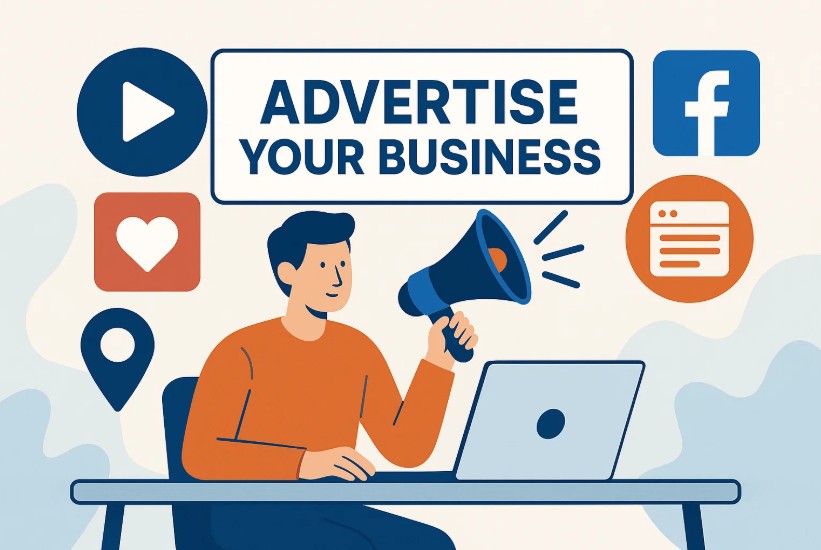Building Smarter Campaigns: How AI Is Used in Advertising and Targeted Marketing
In the rapidly evolving advertising landscape, integrating Artificial Intelligence (AI) has become a game-changer. Marketers increasingly leverage AI technologies to enhance their campaigns, optimize spending, and improve customer engagement.
Today’s marketers are under more pressure than ever to deliver measurable results. As budgets tighten and competition grows, understanding how AI is used in advertising gives brands a serious edge. From automated ad placement to predictive targeting, AI is helping marketers make smarter, faster, and more informed decisions about where (and how) to reach their audiences.

The Rise of AI in Advertising
AI’s influence in advertising is undeniable, with a significant number of marketing teams reporting clear returns on investment. According to a recent study, 93% of CMOs and 83% of marketing teams report positive outcomes from their AI initiatives. This trend is reshaping how brands connect with consumers.
AI-targeted advertising relies on machine learning and data analytics to understand behavior, predict outcomes, and optimize ad performance in real time. It’s not just about automation; it’s about precision. AI allows advertisers to create hyper-targeted campaigns that deliver the right message to the right person at exactly the right time.
For example, AI can analyze millions of data points (search behavior, demographics, purchase intent) to automatically serve customized ad experiences. This level of accuracy means better ROI, higher engagement rates, and stronger brand awareness.
Transforming Advertising Economics
As production costs decrease, advertisers’ opportunities multiply. This shift allows brands to explore innovative strategies that were previously cost-prohibitive.
AI contributes directly to this economic transformation. Automated ad buying through programmatic platforms reduces human error, while dynamic creative optimization (DCO) adapts ad visuals and messaging in real time to improve performance.
For small and mid-sized businesses, AI has made sophisticated advertising accessible. Instead of relying on large creative teams or manual targeting, AI-driven advertising tools enable cost-effective campaign management and performance tracking across multiple platforms.
AI-Powered Search Advertising Growth
AI is not just a passing trend; it is set to revolutionize search advertising.
AI search advertising uses algorithms that learn from user queries, click patterns, and engagement history to deliver more relevant results and ads. Tools like Google’s Performance Max and Microsoft Advertising’s AI-driven Smart Campaigns help advertisers reach consumers more accurately, improving conversions while minimizing wasted spend.
When paired with audience data, AI enables advertisers to identify the intent behind searches (not just the keywords), unlocking a deeper understanding of customer motivation.

Benefits of AI in Targeted Marketing
AI’s capabilities extend beyond mere automation; it offers profound benefits in targeted marketing. By analyzing vast amounts of data, AI can identify patterns and preferences that inform marketing strategies.
The real power of AI-targeted advertising lies in its ability to process information faster than any human could. AI platforms can analyze behavior across websites, social media, and email interactions, allowing marketers to deliver highly relevant ads that align with audience interests and stage in the buyer journey.
Enhanced Personalization
One of the most compelling advantages of AI in advertising is its ability to create personalized experiences. Personalized ads generated with AI have reported 10% to 25% increases in return on ad spend (ROAS). This level of customization not only improves customer satisfaction but also drives conversion rates.
For example, eCommerce brands use AI to recommend products based on browsing history or prior purchases. In contrast, B2B marketers use predictive analytics to personalize ad messaging for specific industries or job titles.
AI ensures personalization at scale; every user interaction becomes an opportunity for smarter targeting. This is how AI-targeted advertising turns data into deeper customer connections.
Efficiency in Campaign Management
AI tools streamline campaign management by automating repetitive tasks, allowing marketers to focus on strategy and creativity. This efficiency leads to faster execution and better resource allocation, ultimately enhancing the overall effectiveness of marketing efforts.
Modern AI marketing platforms can automatically adjust ad bids, test creative variations, and shift budget allocation to higher-performing channels in real time. These insights empower marketers to pivot instantly rather than waiting for manual reporting cycles.
This is especially powerful for brands running multichannel campaigns. AI consolidates campaign data into unified dashboards, providing instant visibility into what’s working and what’s not.
Challenges and Ethical Considerations
Despite the numerous benefits, integrating AI in advertising is not without challenges. Marketers must navigate ethical concerns and potential pitfalls associated with AI technologies.
As brands adopt AI more widely, transparency and trust are becoming essential. Consumers expect brands to use their data responsibly, and advertisers must balance personalization with privacy.
AI-Related Incidents
Many marketers have encountered AI-related incidents in their advertising efforts, including hallucinations, bias, or off-brand content. These issues can undermine trust and damage brand reputation, making it crucial for marketers to implement responsible AI practices.
To prevent these issues, leading companies establish “AI governance” frameworks, ensuring that algorithms are regularly audited for fairness and brand alignment. Training AI models on ethically sourced data also minimizes the risk of bias.
Maintaining Brand Integrity
As AI technologies evolve, maintaining brand integrity becomes paramount. Marketers must ensure that AI-generated content aligns with their brand values and messaging. This requires a careful balance between leveraging AI’s capabilities and preserving the brand’s authenticity.
Brands using AI-targeted advertising must remain vigilant about tone and context. AI can suggest headlines or images, but human oversight ensures that creative outputs reflect the brand’s voice and values. The strongest advertising strategies blend AI precision with human empathy.
The Future of AI in Advertising
The future of AI in advertising looks promising, with continuous advancements expected to reshape the industry. As AI technologies become more sophisticated, their applications in advertising will expand, offering new opportunities for brands to connect with consumers.
Emerging technologies like computer vision, natural language processing (NLP), and generative AI make ad creation and placement smarter and more intuitive. From automated video production to voice-based ad optimization, the next evolution of AI will make marketing more dynamic than ever.
Increased Adoption of Generative AI
Many advertisers are already using or planning to use generative AI for video ad creation. This trend indicates a shift toward more dynamic and engaging content that resonates with audiences.
Generative AI tools such as Synthesia and Runway enable marketers to produce custom video ads in minutes—no studio required. For B2B marketers, this means scaling personalized content creation without inflating budgets or timelines.
AI-Driven Ad Spend Projections
AI-driven ad spend is expected to account for 13.6% of total search ad spend by 2029, up from just 1% in 2025. This significant growth underscores the increasing reliance on AI to drive marketing strategies and improve ROI.
This exponential rise highlights one key truth: AI isn’t replacing creativity, but rather amplifying it. As advertisers continue to explore how AI is used in advertising, the most successful will be those who combine machine intelligence with human insight.
Conclusion
As AI continues to evolve, its role in advertising and targeted marketing will only grow. Marketers who embrace these technologies will be better positioned to create smarter campaigns that resonate with consumers. However, it is essential to approach AI integration thoughtfully, addressing ethical concerns and ensuring brand integrity.
By doing so, brands can harness AI’s full potential to drive engagement, enhance customer experiences, and ultimately achieve greater success in their marketing efforts.
The bottom line? AI-targeted advertising isn’t just the future—it’s the present. Brands that invest in AI today will not only stay ahead of their competition but also redefine what marketing success looks like tomorrow.
Let’s Take Your Campaigns to the Next Level
Ready to transform your B2B lead generation with the power of AI? Abstrakt is at the forefront of integrating advanced AI strategies into targeted marketing campaigns. Let us help you build smarter, more effective campaigns that drive substantial growth for your business.
From AI-driven ad targeting and predictive analytics to generative content creation, we combine creativity with technology to help brands reach the right audience and convert them into lasting customers.
Contact us to learn more about our services and how we can contribute to your success.


